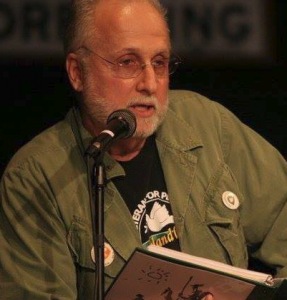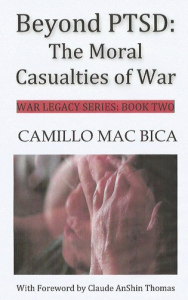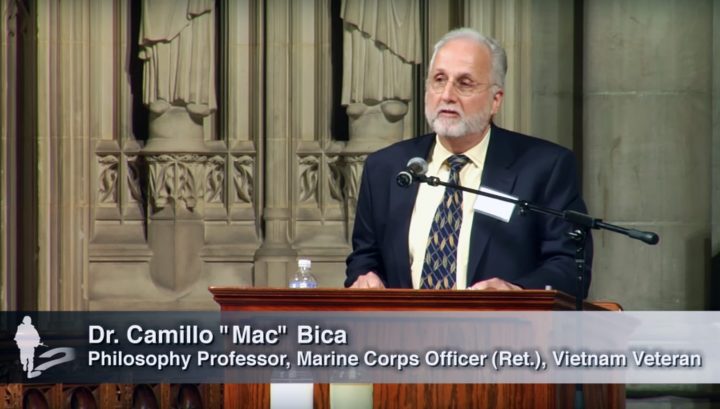By j.jill
“I wish I would have left”, “but I didn’t have the courage to walk away. So I stayed. I regretted it. I still regret it. It didn’t take me long during the Vietnam experience to realize that it wasn’t what it was supposed to be.”
Veterans for Peace is a global organization of military veterans and allies whose collective efforts are to build a culture of peace by using their experiences and voices. They inform the public of the true causes of war and those enormous costs, with the obligation to heal those wounds. Their network is comprised of over 100 chapters in the U.S. and Vietnam as well as the UK. Their work includes: educating the public, advocating for a dismantling of the war economy, providing services that assist veterans and victims of war, and most significantly, working to end all wars. Always the goal is to change public opinion in the U.S. from an unsustainable culture of militarism and commercialism to one of peace, democracy, and sustainability. Veterans for Peace does this primarily, although not exclusively, through grassroots organizing and education at the local level. It raises awareness about the true costs of war and serves as an advocate for peace as a national policy. https://www.veteransforpeace.org/
 Camillo Mac Bica, Ph.D., is a professor of philosophy and ethics at the School of Visual Arts in New York City. His philosophical focus is in Applied Ethics, particularly the relation between war, morality, and healing. Dr. Bica is a former United States Marine Corps Officer and veteran of the Vietnam War. He is a long time activist for peace and justice, a member of the Vietnam Veterans Against the War, and Coordinator of the Long Island Chapter of Veterans for Peace. In addition to the three books in his War Legacy Series, Worthy of Gratitude, Beyond PTSD, and There are No Flowers in a War Zone, articles by Dr. Bica have been published in numerous philosophical journals and online alternative news sites. His books are available through Amazon, Gumroad and directly through his website – http://www.camillobica.com/
Camillo Mac Bica, Ph.D., is a professor of philosophy and ethics at the School of Visual Arts in New York City. His philosophical focus is in Applied Ethics, particularly the relation between war, morality, and healing. Dr. Bica is a former United States Marine Corps Officer and veteran of the Vietnam War. He is a long time activist for peace and justice, a member of the Vietnam Veterans Against the War, and Coordinator of the Long Island Chapter of Veterans for Peace. In addition to the three books in his War Legacy Series, Worthy of Gratitude, Beyond PTSD, and There are No Flowers in a War Zone, articles by Dr. Bica have been published in numerous philosophical journals and online alternative news sites. His books are available through Amazon, Gumroad and directly through his website – http://www.camillobica.com/
Speaking with Camillo “Mac” Bica makes history reverberate with raw authenticity. No pretense, no airs, no reality TV. He meets for an interview on a windy October day in his spacious home on a winding side street in Suffolk County, Long Island. I park the car on a steep incline and pull the hand brake tight. He welcomes with an openness and points to a thick wooden trestle dining table. “Is this okay?” His warm manner, easygoing smile and light eyes meld into this balance of a warrior-docent. As he sits, leans back, it becomes understandable how masterful he must be in an academic setting. After more than thirty years, he still teaches ethics at Manhattan’s School of Visual Arts. We explore his thoughts on education, war and peace in governance and morality.
What is the most meaningful aspect of teaching ethics of war and peace in an art school? How might this differ in another institution of higher learning? Most students in an art school aren’t concerned with majors in poli-sci, philosophy or activism as much as the photography, fine art, illustration, any of the arts, at least in the beginning, Bica suggests. “Still, some have seen the relevance of their art to what goes on in the world—socially engaged art.” Yet, there are certain students, who Bica calls, “sparkplugs” whose spirit and awareness motivate others towards socially engaged art, peace clubs, demonstrations. “They are the catalysts, the motivation to stimulate the others and then, after four years, they’re gone. Then what happens?” “Kids need to be out there working,” he continues, “not just theorizing about issues.” In fact, Bica recalls a particular art student who had also been a veteran who made a very official-looking sign reading, “Beware: This is a Drone Zone” and posted it in various bus enclosure locations around the city, raising awareness and, Bica admits, some turmoil as well. There are some veterans at the School of Visual Arts, he says, but they seem less interested in activism and are less willing to express their opinions.
What have been the most valuable assets of your military career and experiences? “Boy that’s such a hard question. Probably several…do you think? “Being the son of Sicilian immigrants opened my eyes,” Bica muses. “My father was an Italian interpreter in World War II. When my father spoke about that event, his whole demeanor changed. Both my parents were very appreciative…they thought they were very lucky to be living in the United States of America. I was brought up being very patriotic and to accept the responsibilities of giving back to my country.” Vietnam for Bica proved not what it was supposed to be. “It didn’t take me long to realize that what I had anticipated wasn’t what I had expected. Reality proves disappointing. I had the rose-colored glasses.” He pauses and seems to visualize a past. “I wish I would have left,” he says, “but I didn’t have the courage to walk away. So I stayed. I regretted it. I still regret it. It didn’t take me long during the Vietnam experience to realize that it wasn’t what it was supposed to be. So, one of the assets of my military career was not something specifically about benefits or training, character building, but I learned the insanity of what war is, to question things, and I learned to be…a criminal. This certainly changed my outlook in life.” Not long after leaving Vietnam, I joined organizations concerning the peace movement – Vietnam Vets against the War, Veterans for Peace.”
Regarding the withdrawal of US troops from Syria, Bica takes a pragmatic, but sad view. “It’s only a matter of time. Getting out is necessary,” he says. “A lot of people suffering and dying—yes, but it’s a necessary step and it’s inevitable. It’s going to happen now or ten years from now in Syria…it’s going to happen in Afghanistan…like we did in Vietnam. It’s only a matter of time.” As he thinks about the horrific unavoidable, his thoughts turn sharply to peace.
“I remember when I did one of those conversations with the Afghan Peace Volunteers with one of my classes, and one of the questions I asked one of the young Afghans was just that—what’s going to happen when America decides to pull out of Afghanistan? What’s going to happen to the women, all of the things we allege we’ve accomplished in Afghanistan? The Afghan youth answered, “Look, before we had to worry about the Taliban and staying alive and hope they don’t kill us. Now we’ve got to worry about two things—the Taliban killing us and Americans killing us. So we’ve just doubled the threat that we have. These are problems we have to work out ourselves—democracy, freedom and all of these wonderful things we want, cannot be imposed from the outside. They have to come from us and we don’t need you to fix us.” Those statements from a young Afghan informed Bica of how he views foreign presence in other lands.
How and when did you become involved with Veterans for Peace? Bica explains that it took time for him to acclimate himself, as most veterans, to come back after combat, to a routine life without the camaraderie and understanding the unique perspective of those who have served in military life and death situations. With time, he joined the Vietnam Veterans Against the War (VVAW) and is still a member. Soon he felt that he should be for something rather than against, so he gravitated to Veterans for Peace. He made connections and eventually he became coordinator for the Veterans for Peace – Long Island chapter which has twenty active members today.
In your opinion, what changes need to be made in policies concerning the military, foreign and domestic? The difficult question stops the reminiscing of his past. “Wow. That’s a difficult question. I wish I had the answers, but I don’t.” His smile fades. “I don’t think it’s my job to come up with the solutions, but something has to be done. It reminds me of the old saying, “When all you have is a hammer, everything looks like a nail.” It seems like every conflict or disagreement has to be resolved with war. We’ve lost the skills of diplomacy. We need to get that back. We have to stop projecting our global presence into the world. We need to eliminate the 700-800 bases that we have all over the world. We need to bring our troops home. We have to stop meddling in the affairs of others.” Bica continues with emphasis. “If you trace the chaos and turmoil in the world throughout history, you are eventually going to see the footprints of the United States, either for global dominance or oil reserves….” Then, he pauses again and counters with thoughts of a philosopher. “I don’t think we should become isolationists, but could you imagine what good could have been done with the trillions of dollars spent on these wars? I mean…food, education…look, people don’t strap dynamite to their chests and blow themselves up because they are content or because things are going well. They do it because they see problems. They have frustrations and they see no other way of resolving these but to use violence. Terrorism, guerrillas survive because they rely on the frustrations of the people. And if you eliminate the frustrations of the people, you eliminate the ability of the terrorists and the guerillas to operate. You eliminate their source of manpower and wealth. Whenever we drone a wedding party or a funeral, you have completely gone against what you are trying to accomplish. These wars, as in Vietnam, are all wars of attrition. Unlike World War II, you went in, you divide the land and you go home—these wars aren’t like that. You can’t accomplish your goal if the tactics you’re using to accomplish that goal are self-defeating! You can’t win a war of attrition if the tactics you are using are creating more of the people you are trying to kill. When you go drone attack a village and kill two high-ranking Al-Qaida officials, you’ve just created about 300 more terrorists. It just doesn’t make any sense! If you look at the eighteen plus years we’ve been in Afghanistan, how long do you have to prove that bombing does…not…work! Doing something over and over again is the definition of insanity.” Bica isn’t sure the quote is attributable to Einstein. “But,” his voice raises, “at some point, you have to say let’s try something different! What do we have to lose? We need to try something different we have to work for peace and not for war.”
And we can find other ways, assures Bica, proposing William James’ The Moral Equivalent of War. There are qualities that are built in the military, like comradeship which are positive relationships, but he says, “we need to find an alternative way of developing those qualities. And James suggests a program of national service.” But Bica differs with James in that he believes that the natural condition of humankind is that of peace and that our development of “civilization” leads to violence and war. This recalls the writings of Thomas Berry in The Dream of the Earth in 1988.
 You have three candid publications in the War Legacy Series concerning military service, Worthy of Gratitude?: Why Veterans May Not Want to be Thanked for their “Service” in War; Beyond PTSD: The Moral Casualties of War; and There Are No Flowers in a War Zone. Of your three publications, which was the most fulfilling for you to express and why? Taking the time to review his writings, each has its value, he says. But the most important, he believes, was his second book, Beyond PTSD: The Moral Casualties of War. “War is an affront to our moral being,” Bica explains. My field of study is war and violence and I have this ability to shift between these two personalities of mine—the philosopher and the war veteran. Beyond PTSD was a critical book, I think, because moral injury has not been taken seriously for many, many years.” He goes on to stress that at the before today’s recognition of PTSD and moral injury, psychiatrists held the notion that morality was clinically irrelevant…not really an issue in the healing of veterans. There is a difference between PTSD and moral injury, he sustains. “Moral injury isn’t necessarily the consequence of a traumatic event. It’s the consequence of realizing the violation, a transgression of a deeply-held moral principle, an important part of our being, of who we are…and we violate that. So, I think that Beyond PTSD was very important for me personally to get that out.”
You have three candid publications in the War Legacy Series concerning military service, Worthy of Gratitude?: Why Veterans May Not Want to be Thanked for their “Service” in War; Beyond PTSD: The Moral Casualties of War; and There Are No Flowers in a War Zone. Of your three publications, which was the most fulfilling for you to express and why? Taking the time to review his writings, each has its value, he says. But the most important, he believes, was his second book, Beyond PTSD: The Moral Casualties of War. “War is an affront to our moral being,” Bica explains. My field of study is war and violence and I have this ability to shift between these two personalities of mine—the philosopher and the war veteran. Beyond PTSD was a critical book, I think, because moral injury has not been taken seriously for many, many years.” He goes on to stress that at the before today’s recognition of PTSD and moral injury, psychiatrists held the notion that morality was clinically irrelevant…not really an issue in the healing of veterans. There is a difference between PTSD and moral injury, he sustains. “Moral injury isn’t necessarily the consequence of a traumatic event. It’s the consequence of realizing the violation, a transgression of a deeply-held moral principle, an important part of our being, of who we are…and we violate that. So, I think that Beyond PTSD was very important for me personally to get that out.”
There seems to be a growing awareness about the role politics, countries and corporations play in the promotion and machinery of war. How can concerned individuals be a part of solutions against perpetual war? Bica takes a deep breath and stretches back in his chair. “I first think that we have to realize the involvement of the military-industrial complex. Eisenhower was right when he warned that we have to beware of the military-industrial complex. We have to get the money out of elections—corporations and big money buy political influence. When corporations thrive on war, war is going to become very common and very frequent.” Thus, we have perpetual war. “It’s unique in the history of humankind that we have a war machine that remains intact, producing more armaments even at a time when we are not in a war. After World War II, all the corporations saw how profitable the war industry is, so rather than go back to making refrigerators, stoves and washing machines, we are going to remain in the industry of war and in order to make a profit, you have to be able to sell more and more weapons and armaments, you need to have wars. So war is going to be following the needs and the dictates of the corporations. Money and greed are problematic.”
The interview concludes with another easy smile and a final thought. “People just don’t see it,” he stresses. “If you have any criticism, maybe it’s because some ideas are just not practical,” he quips when thinking about the general public’s reaction to social programs caring for others. “I can see you making the argument about human beings as selfish. You can’t make the argument that it’s evil…if anything, it’s a benevolent alternative of having a world where people aren’t dying of starvation, aren’t suffering from homelessness and poverty, where everyone is cared for.”
At the afternoon’s conclusion, it’s natural to wonder if and when this philosopher-warrior’s view of peace-violence, order-chaos in our deliberately off-balanced world may reach the minds of those able to listen while there is still time to act.
Making connections through experience has been the foundation of j.jill’s personal philosophy: in education, service, writing, spirituality and the arts. She teaches Italian part-time within the State University of NY system, follows topics in peace & justice advocacy, and enjoys spending time with friends & family including two very affectionate rescue puppies.






